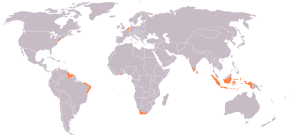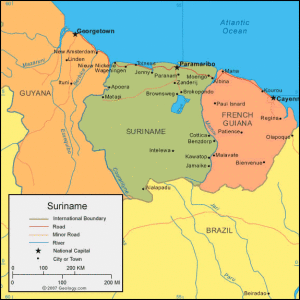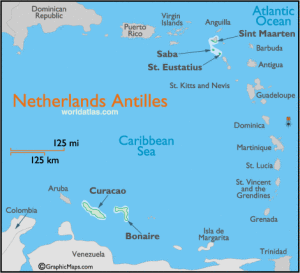Status Caribisch gebied binnen de Europese Unie
![]() Op grond van artikel 198 van het Verdrag betreffende de Werking van de Europese Unie (VWEU) komen de Europese lidstaten overeen “de niet-Europese landen en gebieden welke bijzondere betrekkingen onderhouden met Denemarken, Frankrijk, Nederland en het Verenigd Koninkrijk te associeren met de Europese Unie.” Voor het Nederlands Koninkrijk valt hier de bijzondere relatie onder met de eilanden Aruba, Curaçao, Sint Maarten, Bonaire, Saba en Sint Eustatius.
Op grond van artikel 198 van het Verdrag betreffende de Werking van de Europese Unie (VWEU) komen de Europese lidstaten overeen “de niet-Europese landen en gebieden welke bijzondere betrekkingen onderhouden met Denemarken, Frankrijk, Nederland en het Verenigd Koninkrijk te associeren met de Europese Unie.” Voor het Nederlands Koninkrijk valt hier de bijzondere relatie onder met de eilanden Aruba, Curaçao, Sint Maarten, Bonaire, Saba en Sint Eustatius.
In tegenstelling tot Nederland, maken de eilanden geen deel uit van het grondgebied van de Europese Unie en hoeven zij om die reden dan ook niet te voldoen aan het Europees recht en hebben zij de euro niet als wettelijk betaalmiddel. Door de bijzondere relatie met Nederland komen de eilanden wel in aanmerking voor Europese fondsen en EU brede samenwerkingsovereenkomsten zoals het Erasmus+ programma. Verder bezitten de inwoners van het Caribische deel van het Koninkrijk der Nederlanden naast de Nederlandse nationaliteit ook het Europees burgerschap.
Lees verder: http://www.europeesparlement.nl/caribbean.html
Rijksoverheid ~ Caribisch deel van het Koninkrijk
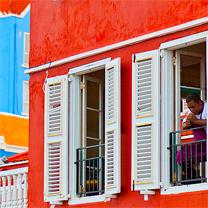 Het Koninkrijk der Nederlanden bestaat uit de 4 landen Nederland, Aruba, Curaçao en Sint Maarten. De laatste 3 landen vormen samen met de 3 bijzondere gemeenten Bonaire, Sint Eustatius en Saba het Caribisch deel van het Koninkrijk. De 3 bijzondere gemeenten samen heten Caribisch Nederland.
Het Koninkrijk der Nederlanden bestaat uit de 4 landen Nederland, Aruba, Curaçao en Sint Maarten. De laatste 3 landen vormen samen met de 3 bijzondere gemeenten Bonaire, Sint Eustatius en Saba het Caribisch deel van het Koninkrijk. De 3 bijzondere gemeenten samen heten Caribisch Nederland.
Lees verder: http://www.rijksoverheid.nl/onderwerpen/caribische-deel-van-het-koninkrijk
Wikipedia ~ Nederlandse koloniën
De Republiek der Zeven Verenigde Nederlanden en het Koninkrijk der Nederlanden (vanaf 1815) hebben diverse koloniën in bezit gehad. Dit koloniale rijk viel uiteen na de Tweede Wereldoorlog.
Lees verder: http://nl.wikipedia.org/wiki/Nederlandse
Wikipedia ~ Suriname
Suriname (/ˈsʊrɨnæm/, /ˈsʊrɨnɑːm/ or /ˈsʊrɨnəm/, also spelled Surinam), officially known as the Republic of Suriname (Dutch: Republiek Suriname, Dutch pronunciation: [ˌreːpyˈblik ˌsyːriˈnaːmə]), is a country on the northeastern Atlantic coast of South America. It is bordered by French Guiana to the east, Guyana to the west and Brazil to the south.
Suriname was colonized by the English and the Dutch in the 17th century. In 1667 it was captured by the Dutch, who governed Suriname as Dutch Guiana until 1954. At that time it was designated as one of the constituent countries of the Kingdom of the Netherlands, next to the Netherlands and the Netherlands Antilles (dissolved in 2010). On 25 November 1975, the country of Suriname left the Kingdom of the Netherlands to become independent. A member of CARICOM, it is considered to be a culturally Caribbean country and has extensive trade and cultural exchange with the Caribbean nations.
At just under 165,000 km2 (64,000 sq mi), Suriname is the smallest sovereign state in South America. (French Guiana, while less extensive and populous, is an overseas department of France.) Suriname has a population of approximately 566,000, most of whom live on the country’s north coast, where the capital Paramaribo is located. Suriname is a mostly Dutch-speaking country; Sranang, an English-based creole language, is a widely used lingua franca. It is the only independent entity in the Americas where Dutch is spoken by a majority of the population.
Read more: http://en.wikipedia.org/wiki/Suriname
Wikipedia ~ Netherlands Antilles
The Netherlands Antilles (Dutch: Nederlandse Antillen [ˈneːdərˌlɑntsə ɑnˈtɪlə(n)] , Papiamentu: Antia Hulandes), also referred to informally as the Dutch Antilles, was an autonomous Caribbean country within the Kingdom of the Netherlands. Although the country has now been dissolved, all of its constituent islands remain part of the kingdom under a different legal status and the term is still used to refer to these Dutch Caribbean islands.
The Netherlands Antilles consisted of two distinct island groups. First, the “windward” or “ABC Islands” — Aruba, Bonaire, and Curaçao — are located in the southern Caribbean Sea, just off the Venezuelan coast. Second, the “leeward” or “SSS islands” — Sint Maarten, Saba, and Sint Eustatius — are part of the Lesser Antilles; they are approximately 800–900 kilometers (500–560 miles) northeast of the ABC Islands. The Dutch colonized the various islands in the 17th century and united them as the Netherlands Antilles in 1954.
The Netherlands Antilles was dissolved on 10 October 2010. Curaçao and Sint Maarten became distinct constituent countries alongside Aruba which had become a distinct constituent country in 1986; whereas Bonaire, Sint Eustatius, and Saba (the “BES Islands”) became special municipalities within the Netherlands proper.
Read more: http://en.wikipedia.org/wiki/Netherlands_Antilles
From Big Brother to Radical Decentralization
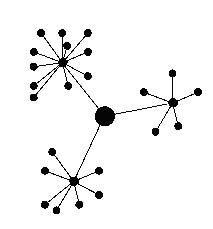 In the past centuries governing has become more centralized, out of necessity and because it made the most sense. The state and its organizations, national as well as international, will not disappear as sources of power and government. However, they can no longer govern alone.
In the past centuries governing has become more centralized, out of necessity and because it made the most sense. The state and its organizations, national as well as international, will not disappear as sources of power and government. However, they can no longer govern alone.
Many things will have to be radically re-organized. Districts organize their own waste collection and every home is energy supplier. The adage for the next decennium will be: Radical Decentralization.
Sun and waste
Governed from Beijing and in its well-known particular brand of go getting, China is creating giant fields full of solar panels in the Gobi desert. The European Union has found the spirit after the accession of 10 new countries in 2004 and is getting ready to accept the rest of former Yugoslavia (Croatia, Bosnia and Herzegovina, Serbia, Montenegro, Kosovo and Macedonia) after the accession of Slovenia. The role of centralized government is far from played out. And yet a different trend marks the second decennium of this century: Radical decentralization, meaning organizing general interest issues on a micro scale. The size of the scale varies, and ends with the individual. Currently, individualism is not a popular term and brings to mind images of self-enriching bankers. That is one side of the coin. Thanks to the high level of education of for instance Western societies and ongoing technological advancements, we are more than ever capable of shaping our own lives, which creates great opportunities for the individual as well as for society at large. It does require changes from bureaucrats and administrators. In the next decade they will either have to adjust or make room for new ones.


